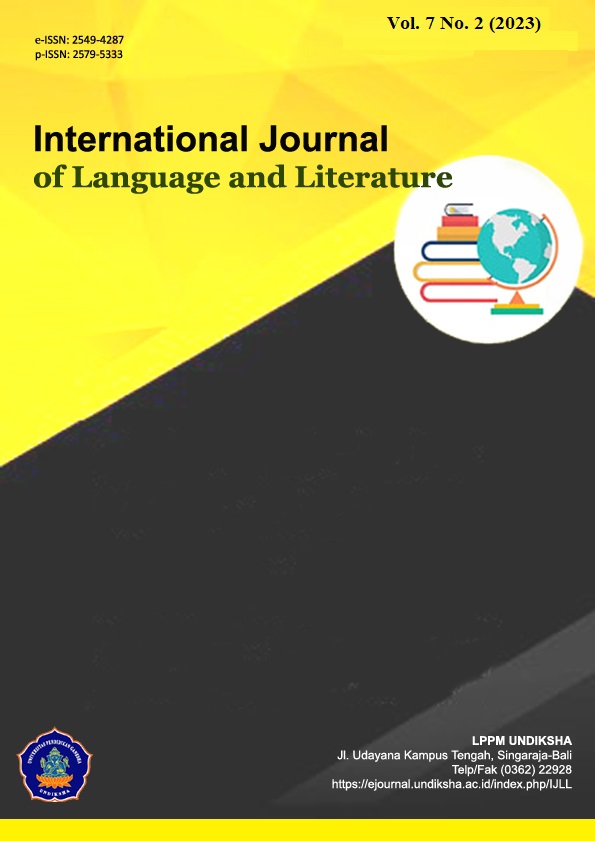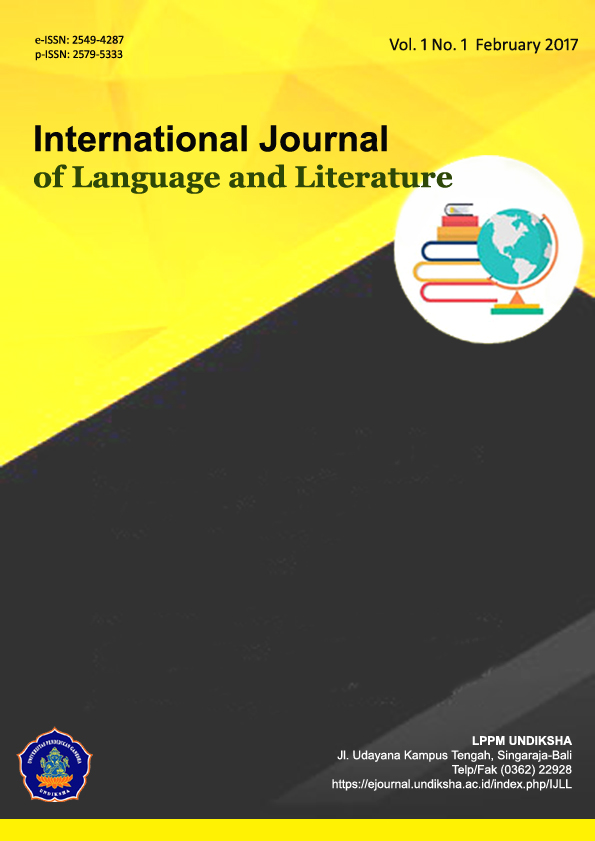Status of Nigerian English
DOI:
https://doi.org/10.23887/ijll.v7i2.60001Keywords:
Nigerian English, Morphological and Syntactical Features, Distinct IdentityAbstract
English emerged in the Nigerian context as a result of the need to communicate with many people from different ethnic backgrounds who speak different languages. However, the uniqueness of Nigerian English appears, which is different from standard English. This study aims to analyze the status of Nigerian English by explaining the morphological and syntactic features and how they differ from Standard English. This study uses a descriptive qualitative approach. The data will be carefully collected to represent various morphological and syntactical aspects. Data will be collected by conducting text analysis and interview, both written and spoken text in Nigerian English. The data collected will be analysed systematically. The result of this study presents the morphological and syntactical features of Nigerian English and how they differ from Standard English. With a brief commentary on its distinct identity, the paper concludes the justification of the notion that Nigerian English must be regarded as one of the world’s Englishes.
References
Adewumi, T., Oladipo, E., & Adewuya, A. O. (2020). Public perception and attitude towards people living with epilepsy in Nigeria. Epilepsy & Behavior, 106, 107033. https://doi.org/10.1016/j.yebeh.2020.107033. DOI: https://doi.org/10.1016/j.yebeh.2020.107033
Awofala, A. O. A., & Blessing, A. E. (2014). Assessing adult learner’s numeracy as related to gender and performance in arithmetic. Journal of New Approaches in Educational Research, 3(2), 83–92. https://doi.org/10.7821/naer.3.2.83-92. DOI: https://doi.org/10.7821/naer.3.2.83-92
Bae, J., & Min, S. (2020). Genre-based Analysis of Syntactic Complexity in L2 College Students’ Writing: Pedagogic Scope and Directions. The Journal of Asia TEFL, 17(3), 937–953. https://doi.org/10.18823/asiatefl.2020.17.3.12.937. DOI: https://doi.org/10.18823/asiatefl.2020.17.3.12.937
Camović, D. (2019). Some aspects of developmentally (non-) stimulating interactions of parents with preschool children – implications of basic determinants of parental behaviour. Sodobna Pedagogika/Journal of Contemporary Educational Studies, 70(4), 170–191. https://search.proquest.com/openview/6ab5bfcc821b4f33b65190d83a20dbf7.
Ekundayo, O. O. S. (2021). Bombast Bombardment and Dense Syntax versus Effective Communication and Language Teaching in ESL Settings: Nigerian English Examples. Colombian Applied Linguistics Journal, 23(2), 229–242. https://doi.org/10.14483/22487085.16161. DOI: https://doi.org/10.14483/22487085.16161
Florence Aduke, A. (2015). Time Management and Students Academic Performance in Higher Institutions, Nigeria — A Case Study of Ekiti State. International Research in Education, 3(2), 1. https://doi.org/10.5296/ire.v3i2.7126. DOI: https://doi.org/10.5296/ire.v3i2.7126
Gunantar, D. A. (2016). the Impact of English As an International Language on English Language Teaching in Indonesia. Language Circle: Journal of Language and Literature, 10(2), 141–151. https://doi.org/10.15294/lc.v10i2.5621.
Hasanah, L., Pradina, S., Hadita, A., & Putri, W. C. (2019). Sociolinguistic Influence in the Use of English as a Second Language (ESL) Classroom: Seeing from Onovughe’s (2012) Perspective. Elsya : Journal of English Language Studies, 1(1), 28–32. https://doi.org/10.31849/elsya.v1i1.2538. DOI: https://doi.org/10.31849/elsya.v1i1.2538
Hashim, H. U., & Yunus, M. M. (2018). English as a Second Language (ESL) Learning: Setting the Right Environment for Second Language Acquisition. Tadris: Jurnal Keguruan Dan Ilmu Tarbiyah, 3(2), 207. https://doi.org/10.24042/tadris.v3i2.2941. DOI: https://doi.org/10.24042/tadris.v3i2.2941
Huberman, A., & Miles, M. (2012). Understanding and Validity in Qualitative Research. In The Qualitative Researcher’s Companion. https://doi.org/10.4135/9781412986274.n2. DOI: https://doi.org/10.4135/9781412986274.n2
Ibna Seraj, P. M., & Habil, H. (2019). A critical review on oral English communication skills (OECS). 3rd International Language & Tourism Conference 2019, 1–12. http://dspace.aiub.edu:8080/jspui/handle/123456789/345.
Idowu, A. I., Chibuzoh, I. G., & I, M. L. (2014). Effects of goal-setting skills on students’academic performance in english language in Enugu Nigeria. Journal of New Approaches in Educational Research, 3(2), 93–99. https://doi.org/10.7821/naer.3.2.93-99. DOI: https://doi.org/10.7821/naer.3.2.93-99
Madyukova, S. А. (2021). Socio-Cultural Space of the City: Ethno-Sociological Focus of Research. Siberian Journal of Philosophy, 19(2). https://doi.org/10.25205/2541-7517-2021-19-2-117-135. DOI: https://doi.org/10.25205/2541-7517-2021-19-2-117-135
Magomedkhan, M. M., & Sadovoy, A. N. (2021). Ethno-social consequences of the depopulation of mountain regions: Dagestan and North Ossetia. In History, Archeology and Ethnography of the Caucasus (Vol. 17, Issue 2). https://doi.org/10.32653/CH172507-522. DOI: https://doi.org/10.32653/CH172507-522
Mayasari, D., & Ardhana, N. R. (2018). Publication of Functional Forms and Syntactic Categories of Manduro Speeches as Supporters of Early Childhood Language Development. Journal of Obsession: Journal of Early Childhood Education, 2(1), 51. https://doi.org/10.31004/obsesi.v2i1.7. DOI: https://doi.org/10.31004/obsesi.v2i1.7
Menggo, S. (2022). Strengthening 21st-century education themes in ELT material for ESP students. VELES Voices of English Language Education Society, 6(1), 25–40. https://doi.org/10.29408/veles.v6i1.4979. DOI: https://doi.org/10.29408/veles.v6i1.4979
Moyi, I. M., & Galadima, S. (2020). Investigating the Causes of Poor Speaking Ability in the English Language among University Students in Northern Nigeria. Global Academic Journal of Linguistics and Literature, 2(3), 1–17. https://doi.org/10.36346/gajll.2020.v02i02.001. DOI: https://doi.org/10.36349/easjehl.2020.v03i10.005
Nassaji, H. (2015). Qualitative and descriptive research: Data type versus data analysis. Language Teaching Research, 19(2), 129–132. https://doi.org/10.1177/1362168815572747 DOI: https://doi.org/10.1177/1362168815572747
Nishanthi, R. (2018). The importance of learning English in today world. International Journal of Trend in Scientific Research and Development, Volume-3(Issue-1), 871–874. https://doi.org/10.31142/ijtsrd19061. DOI: https://doi.org/10.31142/ijtsrd19061
Ntamu, B. A., & Oyo-Ita, M. (2022). Identifying and catering for gifted learners in an inclusive classroom: A means of reducing delinquency, school drop out rate and increasing national development in Nigeria. Global Journal of Educational Research, 21(1), 35–46. https://doi.org/10.4314/gjedr.v21i1.5. DOI: https://doi.org/10.4314/gjedr.v21i1.5
Nwajiuba, C. A., Igwe, P. A., Akinsola-Obatolu, A. D., Ituma, A., & Binuomote, M. O. (2020). What can be done to improve higher education quality and graduate employability in Nigeria? A stakeholder approach. Industry and Higher Education, 34(5), 358–367. https://doi.org/10.1177/0950422219901102. DOI: https://doi.org/10.1177/0950422219901102
Ogunjobi, A. O., & Akindutire, D. A. (2020). A lexico-syntactic analysis of usages in Nigerian English: A validation of its culturally determined context of situation. Journal of Education Research and Rural Community Development, 2(1), 21–34. https://doi.org/10520/EJC-1d70884556.
Okal, B. O. (2014). Benefits of Multilingualism in Education. Universal Journal of Educational Research, 2(3), 223–229. https://doi.org/10.13189/ujer.2014.020304. DOI: https://doi.org/10.13189/ujer.2014.020304
Okenyi, E. C. (2022). Impact of instructional materials on pupils’ academic achievement in social studies in Enugu State, Nigeria. Contemporary Journal of Education and Development, 2(6), 1–9. https://www.cirdjournal.com/index.php/cjed/article/download/749/691.
Onumajuru, V. C. (2013). Promoting the use of the Igbo language among the Igbo people in Nigeria and in the diaspora. Awka Journal of Linguistics and Languages, 7(1), 76–100. https://journals.unizik.edu.ng/index.php/ajill/article/view/140.
Owoeye, J. S. & Yara, P. (2021). Class Size and Academic Achievement of Secondary School in Ekiti State, Nigeria. Asian Social Science, 7(6), 184–189. https://doi.org/10.5539/ass.v7n6p184. DOI: https://doi.org/10.5539/ass.v7n5p170
Pransiska, R. (2017). Benefits of Bilingualism in Early Childhood: A Booster of Teaching English to Young Learners. January 2017. https://doi.org/10.2991/icece-16.2017.68. DOI: https://doi.org/10.2991/icece-16.2017.68
Saputra, J., Rahmadeny, M., & Jazzawi, I. (2019). The Importance of Sociolinguistics in Foreign Language Education: A Review of Selected Paper. International Journal for Educational and Vocational Studies, 1(4), 299–303. https://doi.org/10.29103/ijevs.v1i4.1415. DOI: https://doi.org/10.29103/ijevs.v1i4.1415
Sharma, C., & Puri, S. R. (2020). The importance of four skills in English education. The Genesis, 7(4), 33–36. https://doi.org/10.47211/tg.2020.v07i04.007. DOI: https://doi.org/10.47211/tg.2020.v07iws01.003
Smiley, A., Cao, Y., Moussa, W., Dooley, B., & Sullivan, J. (2020). Examining “best practices” for literacy coaching and monitoring: Evidence from Northern Nigeria and Ghana. Social Sciences & Humanities Open, 2(1). https://doi.org/10.1016/j.ssaho.2020.100014. DOI: https://doi.org/10.1016/j.ssaho.2020.100014
Taşçı, S., & Turan, Ü. D. (2021). The Contribution of Lexical Breadth, Lexical Depth, and Syntactic Knowledge to L2 Reading Comprehension Across Different L2 Reading Proficiency Groups. English Teaching and Learning, 45(2), 145–165. https://doi.org/10.1007/s42321-020-00065-z. DOI: https://doi.org/10.1007/s42321-020-00065-z
Unuabonah, F. O., & Oladipupo, R. O. (2021). Bilingual pragmatic markers in Nigerian English. World Englishes, 40(3), 390–406. https://doi.org/10.1111/weng.12453. DOI: https://doi.org/10.1111/weng.12453
Usman, M. H., & Hussaini, M. M. (2017). Analysis of Students’ Error in Learning of Trigonometry Among Senior Secondary School Students in Zaria Metropolis, Nigeria. IOSR Journal of Mathematics, 13(02), 01–04. https://doi.org/10.9790/5728-1302040104. DOI: https://doi.org/10.9790/5728-1302040104
Downloads
Published
How to Cite
Issue
Section
License
Copyright (c) 2023 Yahia Aseri

This work is licensed under a Creative Commons Attribution-ShareAlike 4.0 International License.
IJLL Journal provides immediate open access to its content on the principle that making research freely available to the public to supports a greater global exchange of knowledge.

This work is licensed under a Creative Commons Attribution-ShareAlike 4.0 International License








